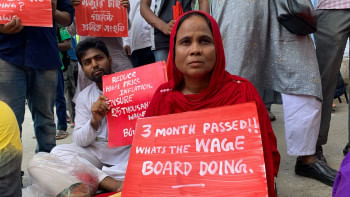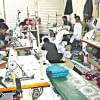Stone crushers deserve a better deal

We are concerned to learn about the dire straits of stone crushers in Lalmonirhat, who work exceedingly hard to advance our economy only to remain deprived of its benefits, including a fair wage. According to a report by this daily, there are about 40,000 labourers at the region's two land ports involved in stone crushing, loading and unloading, who earn about Tk 400 a day. This is a physically demanding job that involves quite a few risks, including the exposure to silica dust which puts them at constant risk of "silicosis" – a debilitating lung disease. But the wages they earn are far from sufficient considering the costs of treatment as well as the high prices of practically everything in today's market. On days when there is no work, there are no wages for them, meaning their families either have to starve or borrow from others to survive. The situation is extremely disheartening.
Against this backdrop, it is only fair that their demand for a daily wage of Tk 700 is given a serious consideration. It is also vital that those who are putting their lives at jeopardy for the nation's development have access to humane work conditions. In 2015, a total of 65 workers at the Burimari union and afflicted with silicosis, including the families of seven deceased workers, collectively filed for compensation, according to the Safety and Rights Society (SRS). It is no secret that on top of low wages, workers in our informal sector also suffer from another layer of vulnerability: minimal job security and non-existent social benefits — such as healthcare packages and compensation schemes — which can be expected from the formal sector.
The result of the disturbing current status quo is a miserable living standard for the majority of the employed population, approximately 85.1 percent of whom work in the informal sector. Unfortunately, these workers are not even recognised as "workers" under the Bangladesh Labour Act, 2006. Needless to say, to achieve holistic economic growth in the country, minimal protection must be provided to workers in the informal sector. We urge the authorities to properly recognise them, including stone crushers, and undertake measures to improve their living and working conditions.


 For all latest news, follow The Daily Star's Google News channel.
For all latest news, follow The Daily Star's Google News channel. 









Comments